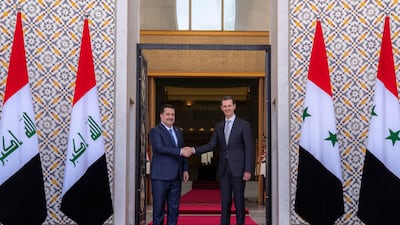Combatting terrorism and drugs trafficking are the main challenges Iraq and Syria face and the two neighbours need to enhance co-operation on this front, the countries' leaders said on Sunday.
Iraq's Prime Minister Mohammed Shia Al Sudani began an official visit to Damascus to boost relations in the first visit by an Iraqi prime minister since the outbreak of Syria's 12-year conflict.
"Drugs are the most dangerous epidemic we are currently facing, and they are no different from terrorism," Syrian President Bashar Al Assad told a joint press conference.
"They have the ability to destroy a society in the same way terrorism does," Mr Al Assad added.
Mr Al Sudani echoed the Syrian president's statements.
He described drug trafficking and consumption as a "dangerous phenomenon that threatens our communities and infiltrates our youth in a destructive and dangerous manner".
During the discussions, both leaders agreed on "establishing mechanisms for co-ordination, tracking and monitoring as the optimal approach to tackle this dangerous phenomenon," he added.
The didn't elaborate on the discussed mechanisms.
The countries share a 600km desert border that continues to see militant activity years after the defeat of ISIS in late 2017.
In recent years, drug trafficking has also increased, with the trade of the amphetamine-like drug Captagon rising in the region, much of it across the Syria-Iraq border.
The US and the EU claim that Syrian government officials are directly involved in the Captagon trade, and the European bloc has sanctioned several in connection with drug smuggling. The Syrian government has dismissed the allegations as "lies."
Iraq was considered a vital corridor for the smuggling of drugs to neighbouring countries before the 2003 US-led invasion that toppled Saddam Hussein’s regime. Since then, drug use in the country has greatly increased.
A succession of weak governments, widespread corruption among security forces and a lack of co-operation between government agencies are the main reasons behind drugs proliferation.
Captagon has become the second most widely used drug in the country, according to the Health Ministry, overtaking tramadol, heroin and hashish in popularity and lagging behind only crystal methamphetamine, the use of which has skyrocketed in southern Iraq.
Iran is said to be the main source of crystal methamphetamine found in Iraq, while Syria is the source of most of the Captagon, Iraqi officials have said. Lebanon is also a source.
'Important visit'
Since the onset of the turmoil, Iraq has positioned itself as a firm supporter of Mr Al Assad’s regime, unlike other Arab countries that cut ties with Syria.
Iran-backed Shiite militias, ostensibly under Iraqi government control, have also been fighting alongside Syrian regime forces, and maintain a presence in much of the country.
Iraq abstained from the 2011 vote that resulted in Damascus's suspension from the Arab League. For years, Iraqi officials have been lobbying to reinstate Syria.
Mr Al Assad described the visit as "important and its significance stems from the depth of the relationship between the Syrian and Iraqi peoples".
"During the war, Iraq offered the most valuable contribution that a person could offer: blood," he said, adding discussions covered fighting terrorism.
"This visit will not only represent a qualitative leap bit also a practical and genuine step towards strengthening brotherly relations," he said.
"There are direct challenges that we face with the foremost being the challenge of terrorism which we consistently witness and remains active and resilient, seemingly never dying," he added.
Trade relations
The visit follows an invitation from the Syrian president more than a month ago, the Iraqi government spokesman Basim Al Awadi told The National.
The leaders were also set to discuss ways to grow trade relations and the possibility of Syria joining the ambitious $17 billion Development Road initiative, Mr Al Awadi said.
The infrastructure project will connect southern Iraq to the border with Turkey, where it will connect European road and rail networks.
Also on the agenda is the possibility of reopening a Mediterranean oil export pipeline, which could help Iraq diversify its export routes, he added.
Both leaders also discussed ways to combat drought conditions in both countries caused by a reduction in rainfall, climate change and upstream dams built by Turkey on the Tigris and Euphrates.
"We need to co-operate to get our fair share of water," Mr Al Sudani said.
In early June, Syrian Foreign Minister Faisal Mekdad visited Baghdad and appealed for humanitarian support in the wake of a simmering, decade-long conflict and a devastating earthquake in February.
The visit comes more than two months after the Arab League agreed to end Syria's suspension from the 22-member bloc.
The suspension was a response to Syrian President Bashar Al Assad’s repression of pro-democracy protests in 2011, which sparked further conflict.


